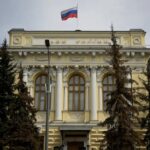Russia has increasingly turned to cryptocurrencies to address challenges with ruble transactions. But it’s not exactly a silver bullet.
Russia has increasingly turned to cryptocurrencies to address challenges with ruble transactions including convertibility issues, payment delays caused by Western sanctions and exchange rate volatility.
While crypto may enable Russia to finance illicit activities or facilitate limited trade, its broader adoption in international commerce remains uncertain due to the hesitancy of Moscow’s partners and heightened scrutiny from Western governments.
Where does Russia stand on digital currencies?
Since Russia’s full-scale invasion of Ukraine, authorities have taken significant steps to promote and regulate cryptocurrencies after years of hesitation.
A new set of laws that took effect in November 2024 legalizes cryptocurrency mining and permits crypto payments for international transactions, though domestic payments are not legal.
The regulations require large crypto miners — those who receive cryptocurrency as a reward for using their hardware to support blockchain networks — to register with tax authorities.
Meanwhile, Russia initiated its first international cryptocurrency transactions in late 2024 under a confidentiality regime. Central Bank Governor Elvira Nabiullina said that the pilot program would last up to three years.
What is behind Russia’s move?
Russia’s first objective is to leverage its low energy costs to expand its crypto-mining industry.
By 2023, Russia had become the world’s second-largest cryptocurrency miner and could soon lead the industry globally, according to Bitriver, the country’s largest bitcoin mining provider.
The Russian government has also launched several crypto-related initiatives involving major state-owned enterprises.
For example, Gazprom Neft has announced plans to use flare gas — excess gas burned off during oil drilling — for crypto mining, following the example of countries like Oman.
Better regulation is also intended to improve tax collection and energy management. Under the new laws, the government can restrict mining in regions facing energy shortages, a measure it has already implemented in several regions to prevent blackouts.
More crucially, Russia seeks to use cryptocurrency for international payments beyond the reach of Western regulators.
“What is important is not how much we will receive in the budget from mining, but that the cryptocurrency that is obtained as a result of this mining has legally become the basis for mutual settlements … in the external circuit for goods and services that we receive from our partner countries,” Russian Finance Minister Anton Siluanov said when announcing legislative changes relating to digital currencies.
Cryptocurrencies may offer greater convertibility internationally and, in the case of stablecoins tied to real-world currencies like the U.S. dollar, less volatility than the Russian ruble or other currencies. They also operate with less Western oversight than traditional financial transactions.
Reuters reported this month that Russia has begun accepting cryptocurrencies via intermediaries for oil sales to China and India.
Russian oil companies are reportedly using bitcoin and the U.S. dollar-pegged stablecoin Tether (USDT) for these transactions. Unlike bitcoin, stablecoins like USDT cannot be mined but can be acquired using other cryptocurrencies.
To improve the domestic circulation of crypto, Russia has drafted rules allowing “highly qualified” investors to trade cryptocurrencies within an experimental framework.
Can Western regulators close the crypto oversight gap?
Western governments have increased scrutiny of cryptocurrency use, particularly as adversaries like Iran and North Korea have expanded their involvement in the sector.
The U.S. recently sanctioned the Garantex crypto exchange for alleged money laundering, leading to the arrest of Russian resident Aleksej Besciokov in India. U.S. authorities seized $27 million worth of stablecoins linked to Garantex.
There are avenues for illegal or grey area activities in the cryptocurrency world, with nefarious players resorting to unknown or disreputable exchanges like Garantex, peer-to-peer trading platforms or techniques to hide their identity, sanctions analyst George Voloshin told The Moscow Times.
“These limitations make crypto crime prevention difficult, so most investigations are largely reactive. However, the Western governments, with the help of industry professionals, have gotten pretty good with tracking and seizing illicit assets,” Voloshin said.












